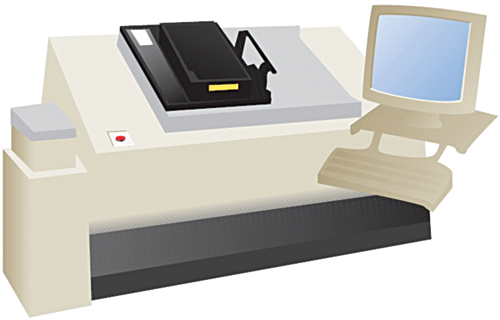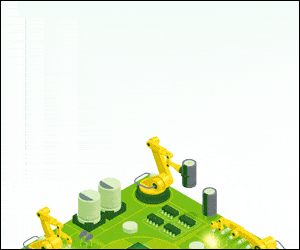Nowadays, a wide range of machines are available. These offer throughput as high as 25,000-45,000 components per hour, with mount precision as good as 30 microns. High-speed changeover facilities, intelligent tape feeders and conveyors, 5-megapixel inline inspection systems, high-speed and high-resolution automatic optical inspection (AOI) systems, soldering robots, automatic high-speed printers with 12-second cycle time, 10-micron repeatable accuracies at fine pitch and six-channel profiler packs for reflows are some examples of the latest technology available today.
In order to cater to the demands of manufacturers, SMT equipment are undergoing non-stop technical advancements, and some of the significant trends that have been observed in the field are increased parallelisation and flexibility, high levels of software integration, environment-friendly machines for RoHS-based production, machines that can handle smaller components at a faster speed, and small yet intelligent machines.
[/stextbox]
In addition, an upcoming trend in contract electronics manufacturing in India is to offer specialised engineering services as part of the PCB assembly introduction in the manufacturing floor. With the CEMs identifying many shortcomings in the OEM design in the post-manufacturing start, these are being introduced as engineering services. The CEMs look into the OEM design and highlight the possible additional tooling expenses due to violation of the design rule checklist that is drawn-up from the CEM’s capability.
Failure analysis
The probability of device failures has increased substantially with the miniaturisation of SMDs. Also, failure analysis of failed devices has become a challenge than ever before. Specialised equipment and skillsets required for the purpose are yet to catch up in India.
Most of the failure analysis is done by respective component vendors outside India. However, fab-less semiconductor companies in India outsource failure analysis to third-party labs outside India. With more semiconductor companies coming up in India, a few such labs have opened their facilities within India. This has drastically reduced the turnaround time and enhanced correspondence within the engineering teams. This is a potential growth area supporting the electronics industry.
Standards
The growing demand for SMT in the electronics manufacturing segment in India has brought in the commitment from standardisation organisations like IPC, Electrostatic Discharge Association (ESDA) and JEDEC. IPC with its office in India has contributed significantly to awareness in the SMT domain through several international IPC training programmes. The most widely used assembly standard that covers IPC-A-610 E has been translated in Hindi.
As SMD packaging shrinks and stringent requirements need to be devised, ESDA and JEDEC are coming up with joint standards, which are being reviewed by committees from ESDA India. These activities help contribute to the international platform from Indian perspective, and incorporation of feedback encourages further progress and brainstorming in the developing areas.
Training
SMT training is available in India at different levels. Training in equipment installation, handling and operation, and facility set-up is provided by the respective equipment vendor. However, operator-level training for hands-on repair or rework and inspection can be had within India.

Engineer- and operator-level trainings in India are now at par with the internationally acceptable requirements, with IPC certifications available in India. The trainings start from the design, SMT process set-up, process validation, assembly, repair, rework and inspection. Innovative ESD training programmes, design for manufacturing, design for assembly and design for testability are some forthcoming areas. Programme management for CEMs is also an area of development that is expected to come up in India.
However, most of the trainings are customer-driven, specifically for contrast electronics manufacturing where the customer requirement pushes the training type. This is unlike OEMs, which have their manufacturing set-up in India and impart internal training as a new process requirement comes up.
Product data management
An electronic product involves multiple manufacturers in the supply chain at system or sub-system level—PCB fabrication, ASIC development and fabrication, PCB assembly, mechanical assembly and finally system integration and software installation.
Many a times these manufacturers refer to the product information specific to their deliverables. For example, the mechanical parts manufacturer who never gets to see PCB fabrication data like Geber (file format used by PCB industry software) may lack valuable information which could be critical to the end-product’s quality.
Many services are coming up from Indian companies that are increasingly participating in product data management. These services help to establish communication between the participating partners as well as efficiently change the management. The IPC-2581 standard developed by IPC and International Electronics Manufacturing Initiative (iNEMI) is an xML-based scheme representing intelligent data file format, which is increasingly being looked into by OEMs based out of India. These OEMs also participate in the IPC-2581 Consortium helping to improve the standard from Indian manufacturing’s point of view.
Specialised services
With increasing PCB assembly complexity, specialised services are being provided by companies to OEMs and CEMs. These include design for excellence (design for reliability, design for testability and design for Six Sigma) and product data management services.
Reliability study services are also provided by companies. These services test various parameters according to product requirements—like highly accelerated life tests for failures-in-time calculations and high-temperature operating life tests which help failure detection at different times of the product life (like at 100, 500 and 1000 hours). Other tests include solder heat-resistance test, electromagnetic interference/electromagnetic compatibility tests and ESD-qualification tests as per IEC standards.
Third-party certification services in line with these testing services are showing a huge growth in India for products in various applications including telecommunication, military and healthcare. These tests and qualifications are mainly performed at the system level, which verifies the mechanical strength and various other parameters of SMD solder joints.
Specialised rework services for boards with surface-mount components is an upcoming trend in different stages of the board’s life cycle—prototype, production and field returns. These include flip-chip components, package-on-package, inner-layer PCB laminate rework as well as rework of embedded discrete SMD components in the PCB.
Consultants for manufacturing process defects troubleshooting are sought by the Indian CEMs. Design consultation for new SMD component packages, thermal management and power rail design for multiple power rails on a board is also being sought by the Indian OEMs. Also, consultation for Six Sigma process and Japanese manufacturing methods like fool-proofing—in the form of Poka-Yoke and Kaizen (never-ending improvement process)—is being encouraged by the National Productivity Council. Clusters of Indian CEMs are being formed. Benchmarks within each cluster help improve manufacturing practices.
The way ahead
Use of SMT in electronics manufacturing is evolving. New services supporting SMT are helping to set new benchmarks and improve manufacturing practices. The lacunae identified within this segment will be filled over the years driven by other sub-segments.
The author is lead for Surface Mount Technology Association (SMTA) India Chapter activities along with Rajeev Kulkarni. SMTA is an international network of professionals who build skills, share practical experience and develop solutions in electronic assembly technologies including microsystems, emerging technologies, and related business operations










